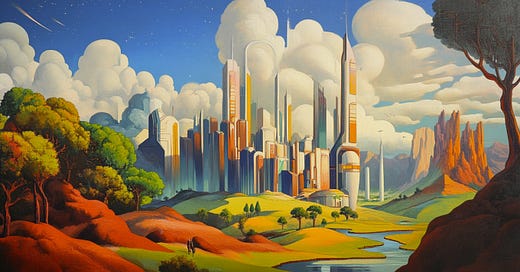🌎📈 Humanity's capacity to grow and thrive: A Quick Q&A with … research analyst Ben Landau-Taylor
'It is is our destiny to get better and more powerful technology — this has been the trend for at least 10,000 years'
For decades, fears of overburdening our planet with too many mouths to feed, too much carbon output, and not enough space to live without mass deforestation and environmental degradation have abounded. I’ve written in the past about the unintended consequences of that doomer mindset: sub-replacement fertility rates, infrastructure-blocking regulation, and a delayed nuclear renaissance are just a few examples.
Ben Landau-Taylor is confident that we’re in no such danger. From his article in Palladium Magazine, “The Limits to Growth Are Interplanetary:”
For centuries, men have believed that rising wealth and population would soon deplete all available resources, causing mass death and social collapse. For centuries, they have been wrong. Predictions of imminent collapse have been a constant since Thomas Malthus, who published An Essay on the Principle of Population in 1798. Malthus claimed that lowering birth rates would help prevent, or at least mitigate, this mass famine and suffering. His heirs say the same thing today. Today there are eight people for every man, woman, and child alive in Malthus’s day, and the eight eat better than the one.
I asked Landau-Taylor a few quick questions about our growth potential as a species.
Landau-Taylor is a senior analyst at Bismarck Analysis. He also the author of his own Substack, where he writes about “power, society, and industry.”
Most people don’t look up numbers, and haven’t spent enough time thinking about systems quantitatively to understand numbers like these as mechanistic components of how reality works rather than as random trivia.
Are there appealing aspects of degrowth theory that attract people to that belief despite contrary evidence?
For a lot of the leading advocates, it’s not a matter of evidence and beliefs about what is happening, it’s about what they think the world ought to look like. Many of them say that humanity is a plague, that capitalist industrial civilization should be dismantled for its own sake, that people should return to primitive lifestyles because that’s a better way to live, that there are too many people and we should reduce the human population by 95 percent to make more room for nature. This is a difference in values, not something that depends on beliefs about future discoveries of lithium deposits or improvements in carbon capture technology or whatever. If there is any evidence that could persuade them, it wouldn’t be evidence about the global ecology and the future of industrial civilization, it would be a better understanding of what it’s actually like to be a subsistence farmer in a tiny village, or live in grass huts and gather berries, or whichever version they’re imagining.
For most of the followers, what’s missing is basic numeracy. If you just listen to the verbal arguments then the degrowth-or-apocalypse story makes as much sense as the ongoing growth story. The difference arises when you look closely at the quantities involved, when you get a sense for how many acres of farmland are required to feed humanity — it’s stayed about the same for the last half century, as yield increases have kept pace with population growth — or if you track the “proven reserves” of oil and other resources outpacing extraction, or near-complete declines in smog, chlorofluorocarbons, dioxins, and other forms of pollution that were prevalent in the 20th century, or improvements in the cost of solar cells and batteries. Most people don’t look up numbers, and haven’t spent enough time thinking about systems quantitatively to understand numbers like these as mechanistic components of how reality works rather than as random trivia. Without this it’s just a matter of which story sounds better narratively, or comes from people you like more.
If our grandparents hadn’t used the best resources available to them, then today we wouldn’t be advanced enough to roll out things like mass reforestation, carbon capture technology, or solar power.
We may not be anywhere close to depleting our natural resources, whether that be oil or iron, but if humanity hopes to self-perpetuate indefinitely, and our key resources are technically limited, do current generations still have an obligation to seek out renewable resource technology?
We owe it to our grandchildren to develop and use the best resource technology we can, whether that’s renewable or not. If our grandparents hadn’t used the best resources available to them, then today we wouldn’t be advanced enough to roll out things like mass reforestation, carbon capture technology, or solar power.
Our critical resource is energy, and we should build more solar power, fossil fuels, waste-to-energy, or anything that can be done efficiently. Right now the single best source of energy is probably nuclear power, so the US should prioritize that especially. I’m skeptical of wind power, which seems expensive and inefficient and mostly a bad use of money and resources, but every other popular form of energy seems like a pretty good bet.
I am also hopeful about geothermal power. In places with good geology, like Iceland, it already supplies incredibly cheap and abundant power without depleting resources, emitting greenhouse gas, or polluting the local environment. With somewhat better drilling technology, this could happen everywhere. I wouldn’t be surprised to see that happen in my lifetime — if we keep developing our energy base by every available method.
Keep reading with a 7-day free trial
Subscribe to Faster, Please! to keep reading this post and get 7 days of free access to the full post archives.




